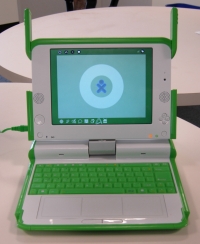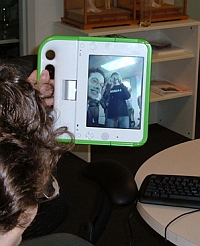The OLPC Wiki is an amazing resource for anyone wondering about the One Laptop Per Child program, its aims, goals, and benefits. It's also a great place to ask questions about the Children's Machine XO-1 and its educational benefits.
But that's not the route Henry Skelton took. He skipped right over the Wiki and its crowdsourcing wisdom and poised a question directly to the Open OLPC listserv. Looking at a strict cost comparison between books and laptops, Henry asked "How will the OLPC truly help education"?
A book costs very little to print (of course, you need material, much of which is copyrighted, but that is no different with digital copies). Certainly much less than $100.How might the OLPC developers and volunteers react to that so direct question? Secure Linux BIOS update developer Ivan Krstić answered first, defending the technology:And then there is a very big issue. Cost. $100/person will not be the cost, ever. Neither will $150 or even $200. You can't just drop off the laptops. You have to give them to each person, set them up, show them how to use it, and when it inevitably has problems, someone has to fix it. I've seen estimates at about $1000/person, and although I haven't investigated them, they seem very reasonable. I'd be interested in what others estimate, though.
So you end up with maybe $5 worth of books for $100-$1000 and all of the problems associated with maintaining a computer. [...] It will have problems, lots of them. Books don't. If they are well taken care of, they last decades, and they can be reasonably expected to last many years.
I would advise some more background research so that you can answer this question for yourself.[...]In fact, you get very few of the problems associated with maintaining a computer; we've been very hard at work to minimize these, both in hardware and software.[...]Then it was time for Michael Burns to re-calculate book values based on physical vs. digital distribution. Working off a $2 per book cost and $100 per child, Michael calculates that:These machines are not comparable to the current computers in Western countries -- such comparisons are misguided. The XO has no moving parts or a standard hard drive, and has a highly optimized, simplified software stack that can repair itself. There are strong social and technological theft deterrents. We're working on making sure viruses and spyware are not a concern.
[W]e could reasonably get several hundred, maybe 1,000(?) books into a village and reasonably assume a distributed library would exist. 1,000 books of whatever metric you choose could be a great thing to give to a child, but it is quite limited compared to the OLPC.[...]And the OLPC laptop has more functionality that a book too. As Bert Freudenberg pointed out in a later email:Each child can get 1,000 books (plus articles, how-tos, tutorials, etc) on a wider range of subjects and kept more up to date (internet access and digital files) with only a few dozen megabytes used on the laptop.
And with the nature of a general purpose computer, those documents can be exchanged, removed and replaced without trouble. Essentially, we are giving the Library of Alexandria, if you will, to each child. Hardcopy books don't quite 'scale' that well.
Do regular books come with unlimited supply of paper and color pens? With scissors and glue to make your own collages? There is a whole lot of infrastructure that we take for granted in our schools, which is just not the case everywhere.So did Thailand make a mistake in not budgeting to buy OLPC in 2007? Are laptops better than books for Thai students? Could the Children's Machine XO really rival the Library of Alexandria?In addition, computers with the right software offer a *lot* more than regular books.
Might a cute little green laptop be equal to the multiple research resources and guides found in a good library; in-depth information categorization, decades of multi-media content, and most importantly, knowledgeable and skilled librarians, in addition to books?
And can it offer all that for less than $150, or $208, or $972 dollars per child?




I wonder what the progress of the digitalization of the actual educational material is. The OLPC can be a personal library of Alexandria. However, I ask, are the "books" being made? I fear that when the OLPC will be available, not many of those books will be available. In other words, you may have just an empty library.
Another question. How is the project dealing with publishing rights (royalties)? The price of the OLPC is pretty much set, but what is the price in royalties also been considered as part of the project? Or is an alternative system being considered (something like wikipedia)?
I think it would be awesome if anyone could come up with a plan to build a library with 24/7 "multiple research resources and guides found in a good library; in-depth information categorization, decades of multi-media content, and most importantly, knowledgeable and skilled librarians, in addition to books" in every little village in a third world country for "less than $150, or $208, or $972 dollars per child."
Till then, the comparisons in your last paragraph are apples to oranges. OLPC has a lot of issues, but feasibility compared to OLPV (one library per village) is certainly not one of them.
I note Michael Burns mentions the causes of failure in machines. One of the most well known laptop failures is in the screen hinges.
I wonder how strong the XO laptop screen hinge is? With constant opening and closing this is obviously the greatest point of stress and most likely to fail.
Nick,
The OLPC will be shipping with Wikipedia subsets. See: http://www.olpcnews.com/content/reference/
There are also multiple efforts to create additional royalty-free content, such as http://www.gutenberg.org which could be included at a country's request, but I do not know how far along they are or how integrated they will be with base OLPC configurations.
There are a number of Libraries working directly, and indirectly, with OLPC. In very practical terms, the machine is quite Library friendly. For XO content providers, such as ourselves, the largest issue has been its wildly innovative display and its final implementation of "markdown". In the end (are we there yet?), our collection of children's books was quite easily converted to meet the requirements of the XO. Online repositories, such as the ICDL, which provides OLPC with books and rights, are only getting bigger and better. OX children, teachers and parents will not want for educationally rich and culturally significant children's books. Unlike many libraries in the areas targeted by OLPC, its shelves will not be empty.
I think the answer is that the OLPC goes beyond the type of education a book can give - based on research that shows that "creation" and "co-creation" among children is a stronger driver of learning than passive reading, or teacher "pushed" classes.
I've seen OLPC presentations and talks on this subjects (e.g. from Mr Bender) , with reference to the studies - but can't lay my hands on them at the moment.
OLPC is one step closer to its Library of Alexandria goal with this week's Community News announcement:
The Boston Public Library has offered to curate a collection similar to the school libraries their librarians help develop for local schools, for international use. Bernie Margolis, the BPL's president, and Maura Manx, heading their digital collections, got general approval for the idea from their board and have Brewster Kahle's explicit support.
They would like to make some of their first collections for children and specifically for schools, and would like to showcase the results on laptops in their main library; including in a display indicating the lifecycle of a digitized work.
http://lists.laptop.org/pipermail/community-news/2007-September/000078.html